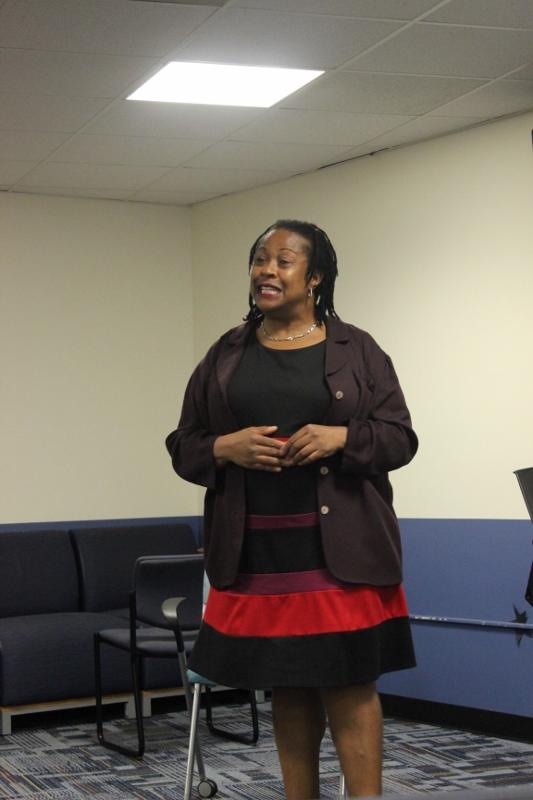Beyond the News Print: The Story of an Award Winning Reporter
More stories from Hailey G Boyle
Maudlyne Ihejirika leads a powerful talk that motivates students and teachers alike.
With a passion and energy that could rival the Energizer Bunny, Maudlyne Ihejirika, an award winning reporter for the Chicago Sun-Times, including the prestigious Studs Terkel Community Award, delivered a talk that inspired some who heard it to go out and change the world.
There is always someone prestigious coming to talk on campus, but no matter how prestigious, if they cannot engage their college audience, they might as well be talking to a wall. From the beginning, Ihejirika had students engaged. Her bold humor and unapologetic honesty hooked her listeners, so much so that as night grew so did the audience.
Before Ihejirika began her talk, she apologized for being late. She had gotten a late breaking scoop in a story she had been working on and had to report it.
Curious students came into the lounge in Student Union and listened as Ihejirika talked about her career in journalism.
“All I ever wanted to do was tell stories,” she said. From as young as six, Ihejirika wanted to tell stories. While her siblings would pour over the comics, she would perch over her dad’s shoulder and and read the Sun-Times with him.
Since being an English major and writing novels wasn’t going to pay the bills, Ihejirika was told about journalism, to which she said, “Journalism — do they pay money?”
She started writing for the student newspaper her senior year at the University of Iowa.
“It will take you away,” she mused. “I was addicted to the adrenaline from getting the scoop.”
Once she graduated from Northwestern’s Graduate program she was hired by the Sun-Times. Her first thought was, “This is the paper my dad used to read!”
Ihejirika started there in 1987 on general assignment and covered a variety of stories, many of which reported on the shortcomings of the Illinois Department of Children and Family Services.
“In those days, DCFS was a hot mess,” she exclaimed. “There were no check points, no one cared…I wrote a series of stories and people lost their jobs and were brought up on charges.”
The head of DCFS actually called Ihejirika, and offered her a job in Public relations. “Everybody’s got a number,” she remarked. She worked in PR for about four years and found that she loved it even though it required her to write things that went against every journalistic instinct.
“When you work in PR, you work for an entity,” she said. When she would get a piece of information and was told to write it a certain way she would say, “This borders on lying.
“Do it,” she said, representing the company. “It took all my skills to get it to place where I felt comfortable.
“Really, it was kind of lying by omission.”
Ihejirika left PR and asked the Sun Times for her job back. Back from the dark side, what journalists call PR, she started looking for stories that she believed in.
“I believe in the underdog,” she said. “I believe in being colorblind in a race obsessed society.”
This thinking led her to write the series “Faces of Minimum Wage,” which won best news series in a large-circulation newspaper from the National Association of Black Journalists’ 2015 Salute to Excellence Awards.
“I beat the Washington Post!” she nearly screamed.
The series ran from September to December in 2014 and chronicled the lives of those living on the then current Illinois minimum wage of $8.25 per hour.
Ihejirika followed them to work. She went to their home. She went to their work. She rode with them on them.
“I didn’t say, ‘Reading public. This is wrong. Change this,” Ihejirika said. “I told their story.”
Ihejirika was the guest speaker at NEIU’s bi-annual Meet the Media Night, where leaders from the four media groups on campus, the radio station WZRD, the literary journal Seeds, the Puerto Rican and Latino/a magazine, Que Ondee Sola and the newspaper, the Independent, meet with students, with the allure of free pizza to encourage them to get involved. The night culminates when a working professional talks about their experiences in the real media world.
Ihejirika’s energy and humor was infectious and bolstered everyone who heard it.
Alejandra Franco, Sports Editor for the Independent told her, “You just inspired me to keep doing what I’m doing.”
Your donation will support the student journalists of Northeastern Illinois University's The Independent, either in writers' payment, additional supplies and other items of note. Your contribution will allow us to purchase additional equipment for writers/photographers/illustrators and cover our annual website hosting costs.




